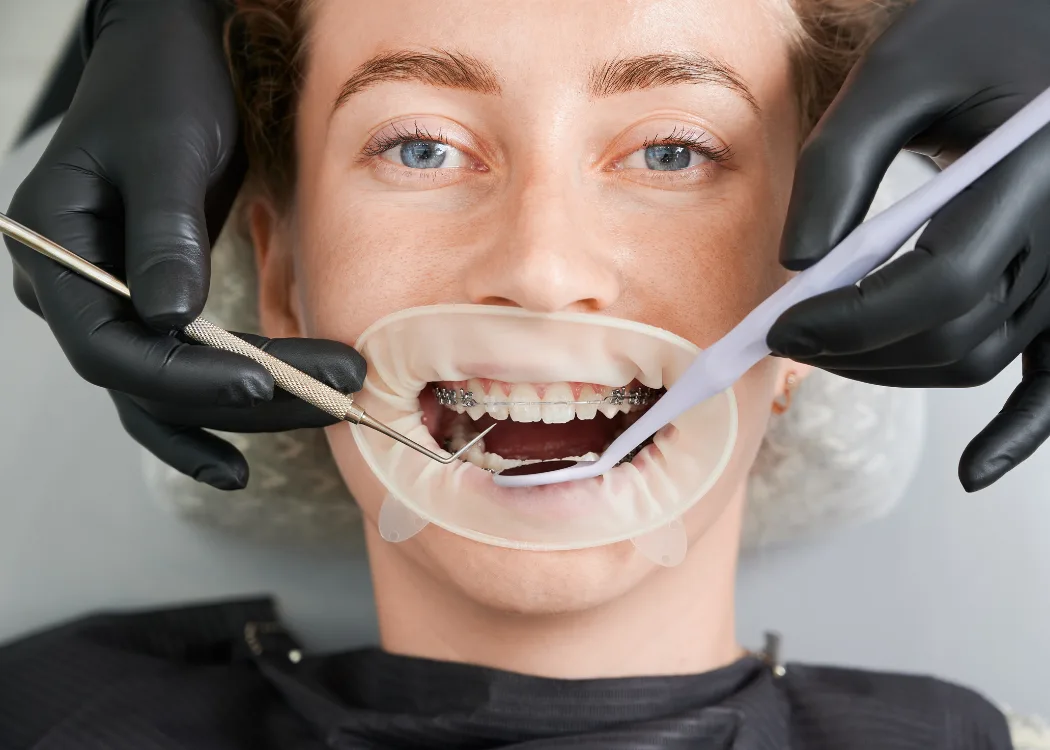Dental implants provide a long-term, natural-looking solution for replacing missing teeth. While the procedure is performed under local anesthesia or sedation, some patients may experience slight discomfort or swelling, which typically improves within a few days.
According to Dr. Eugene Bernstein from Gentle Dental of NJ, “Most patients experience only mild discomfort. We may prescribe antibiotics and painkillers, but after the second or third day, most people don’t need them.”
At Gentle Dental of NJ, we prioritize your comfort, ensuring a smooth and stress-free dental implant experience in Newark, NJ.
Understanding the Recovery Process
The procedure involves placing a titanium post into the jawbone, which serves as the foundation for the artificial tooth.
- The first 24 to 48 hours: Expect the most discomfort and swelling.
- The following days to a week: Pain should gradually subside.
- Few weeks later: You may still experience slight tenderness as the implant fuses with your jawbone. This is a normal part of the healing process.
Immediate Post-Surgery Pain Relief
- Follow Your Dentist’s Instructions
Your dentist or oral surgeon will provide specific aftercare instructions tailored to your situation. These guidelines are designed to minimize pain and reduce the risk of complications. Be sure to follow them closely, including taking prescribed medications, avoiding certain foods, and maintaining proper oral hygiene.
- Use Prescribed Pain Medications
Your dentist may prescribe medication or suggest over-the-counter options, such as ibuprofen or acetaminophen. These help relieve pain and reduce inflammation, a key factor in post-surgery discomfort.
- Apply Ice Packs
Swelling is a natural response to surgery and can contribute to pain. Applying an ice pack to the outside of your cheek near the implant site can help reduce swelling and numb the area, providing temporary relief. Use the ice pack for 15-20 minutes at a time, with breaks in between, during the first 24-48 hours.
Long-Term Pain Management Strategies
Stick to Soft Foods
Choosing soft foods can help prevent irritation and promote healing. Consider including the following in your diet:
- Yogurt
- Mashed potatoes
- Soup
- Smoothies
Avoid hard, crunchy, or sticky foods that could irritate the implant site.
2. Avoid Straws and Vigorous Rinsing
Using a straw or rinsing too vigorously can disrupt healing. Instead:
- Wait 24 hours before rinsing your mouth.
- Use warm saltwater rinses to keep the area clean and promote healing.
3. Maintain Good Oral Hygiene
Proper oral care helps prevent infections that can increase pain:
- Brush gently, avoiding the implant site.
- Your dentist may recommend a special mouthwash to clean the area without irritation.
Natural Remedies for Pain Relief
- Warm Saltwater Rinses
After 24 hours, rinse with warm saltwater to soothe the area and reduce inflammation. Mix 1 teaspoon of salt in a glass of warm water and rinse gently.
- Herbal Teas
Chamomile and peppermint tea have anti-inflammatory properties. Sip warm (not hot) tea for mild pain relief. Avoid using a straw.
- Clove Oil
Known for its natural numbing and antibacterial properties, clove oil can provide temporary relief. Apply a small amount to a cotton ball and gently dab the affected area. Use sparingly to avoid irritation.
Some patients find natural remedies helpful for mild discomfort. However, these should only complement the pain management plan recommended by your dentist.
When to Seek Professional Help
- Severe or worsening pain that doesn’t improve with medication
- Persistent swelling or redness after the first few days
- Signs of infection, such as fever, pus, or a foul taste in your mouth
- Numbness or tingling that doesn’t go away
- The implant feels loose or unstable
Tips for a Stress-Free Recovery
- Rest and Relax
Your body heals best when you rest. Avoid strenuous activities that could increase swelling or discomfort.
- Stay Hydrated
Drinking plenty of water aids recovery. Avoid extreme temperatures that may irritate the implant site.
- Keep Your Head Elevated
Sleeping with your head elevated can help reduce swelling and discomfort. Use an extra pillow or two to prop yourself up during the first few nights after surgery.
Why Choose Gentle Dental of NJ for Your Dental Implant Needs?
While some discomfort is normal after a dental implant surgery, managing it effectively can make all the difference in your recovery.
At Gentle Dental of NJ, our experienced team is dedicated to providing personalized care and support every step of the way, ensuring your dental implant journey is as comfortable and stress-free as possible.
From detailed aftercare instructions to compassionate follow-ups, we’re here to help you achieve a pain-free recovery and a confident, healthy smile.
If you’re searching for dental implants near me, Gentle Dental of NJ is here to help. Contact us today to schedule your consultation!
Frequently Asked Questions
Q: How long does the dental implant process take from start to finish?
The entire process, including healing and placement of the final crown, typically takes 3-6 months. This allows time for the implant to integrate with your jawbone for a stable, long-lasting result.
Q: Are dental implants suitable for older adults?
Yes! Age is not a barrier to dental implants. As long as you have good overall health and sufficient jawbone density, you can benefit from this life-changing procedure.
Q: What if I don’t have enough bone for an implant?
If your jawbone is too thin or soft, we may recommend a bone graft to build up the area, ensuring a strong foundation for your implant.
Disclaimer
Medically reviewed by Dr. Eugene Bernstein, DDS. This content is for educational purposes only and is not intended as medical advice, diagnosis, or treatment. Please consult a qualified healthcare provider for personalized recommendations.

